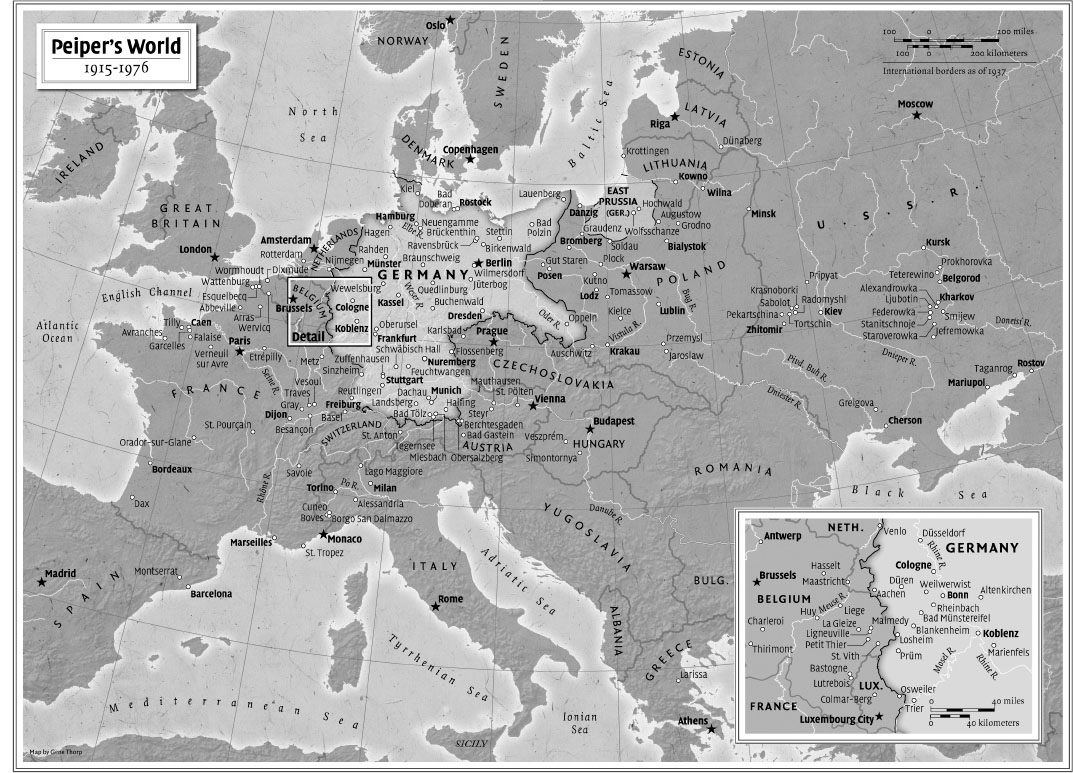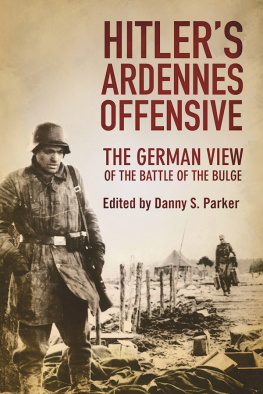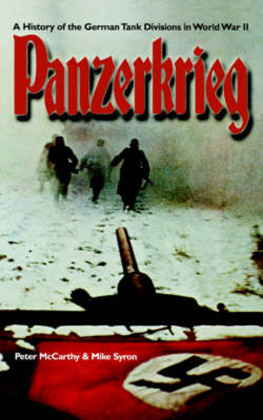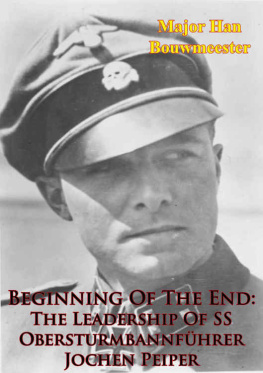HITLERS WARRIOR


Copyright 2014 by Danny S. Parker
All rights reserved. No part of this publication may be reproduced, stored in a retrieval system, or transmitted, in any form or by any means, electronic, mechanical, photocopying, recording, or otherwise, without the prior written permission of the publisher. For information, address Da Capo Press, 44 Farnsworth Street, Third Floor, Boston, MA 02210.
Maps were created by Gene Thorp; all photos are from the authors collection unless otherwise noted.
Editorial production by Lori Hobkirk at the Book Factory.
Set in 10 point Adobe Garamond Pro
Cataloging-in-Publication data for this book is available from the Library of Congress.
ISBN: 978-0-306-82354-1 (e-book)
Published by Da Capo Press
A Member of the Perseus Books Group
www.dacapopress.com
Da Capo Press books are available at special discounts for bulk purchases in the U.S. by corporations, institutions, and other organizations. For more information, please contact the Special Markets Department at the Perseus Books Group, 2300 Chestnut Street, Suite 200, Philadelphia, PA 19103, or call (800) 810-4145, ext. 5000, or e-mail .
10 9 8 7 6 5 4 3 2 1
For two wonderful sisters, Susan and Sharon, and lovely days together
CONTENTS




If only it were all so simple! If only there were evil people somewhere committing evil deeds, and it were necessary only to separate them from the rest of us and destroy them. But the dividing line between good and evil cuts through the heart of every human being. And who is willing to destroy a piece of their own heart?
ALEKSANDR SOLZHENITSYN, THE GULAG ARCHIPELAGO

THE OLD MAN LIKED TO CHOP FIREWOOD FOR RELAXATION. HIS SKIN WAS sunburnt and leathery, and his forehead was etched deeply above his brow. His aging Romanesque profile was topped by wiry hair. It was white now, and his hairline was receding and his eyebrows bushy and unkempt, but his angular features remained handsome in old age. He liked to wear oversized plaid hunting shirts with the sleeves rolled up to his elbows, revealing long, sinewy arms. Although retired, the man often worked outdoors for long hours each day. He loved the gentle rolling green hills of Eastern France. Each sunrise promised the freedom of working with his hands under a broad blue sky. It was a simple life, but for him a satisfying one.
At sixty-one, he was slim and fit, although he had a few complaints. His right legan old war injurybothered him from time to time. Yet each day he would spend an hour or two running his two big Deutsch Drahthaar hunting dogs. Fondly nicknamed Cuno von Grafengau, Timm was the father of the younger puppy, Tamm. My lions, he called them affectionately.
He rose early each morning to review the days schedule over cups of steaming tea. Often the penciled list involved clearing the birch and firs that continuously threatened to reclaim his oasis in the woods. Sometimes it was the blackberry vines. Skilled with an axe and saw, he civilized the wilderness outside and stood against the growth. The task was unending. It was something of a sanguine vision of Camuss Myth of Sisyphus. In the afternoons he often worked a small flower garden he had arduously carved out of the brush. Outside the weather is marvelous, he wrote his good friend. The thermometer on my pigeon coop says 80 degrees. The Sane flows quietly, flowers wink everywhere. My dog Timm walks impatiently back and forth on the terrace as if looking for a forest ghost.
Inside the home was a sanctuary. His wife kept that. Upon arriving at the doorstep, he was careful to clean his boots and leave them outside. Even strangers arriving at the door had to be properly dressed and muddy shoes cleaned before entering. Otherwise the German had to speak with them on the patio under the glass terrace. And even his beloved dogs had to stay outdoors unless she cleaned their paws.
On lazy summer afternoons he and his wife frequently rowed their small wooden boat on the quietly flowing River Sane. The river there was about twice as wide as the man could throw a stone. Each bank was covered by long hanging trees under which the muddy water curled and eddied slowly by, just like the languid pace of life in nearby Traves. A straw hat, fishing reels, and a box lunch could make for a relaxing afternoon among the lily pads. Some days he walked along the high banks of the Sane, watching the swans as he neared the bridge. On other mornings he could be heard tapping away at his typewriter in his study or on the veranda. In the heat of the afternoon he would swim across the Sane several times to relax and cool off, then perhaps some reading under the shade of the saplings he had planted. The vision was French pastorale.
Winter days were equally rustic. Against the cold he would retire to the comfort of his home and carry an armload of his carefully cut wood to the fireplace. A crackling fire provided heat and light as he read in an easy chair. A hot cup of tea would shed any remaining chill. The short days were quiet and uneventful. Here, we have not only silence, he wrote a friend, but also complete peace.
At night he and his wife would share a simple meal. Rather than refined fare, he liked family cookinghearty stews and the like. If it were a special occasion, they might share a bottle of red winea gift from their caring friend, Dr. Benno Mller. After dinner he would ease into his favorite chair, sip tea, perhaps indulge in good pipe tobacco, and spend an hour or so listening to classical music on the hi-fi. Pieces by Bach or Telemann were appropriate if the mood was light. If he were feeling serious, he might choose the rich pathos of Beethovens Eroica Symphony or the Pathtique.
Reading was a passion. He enjoyed the works of Ernest Hemingway. For Whom the Bell Tolls was a favorite, but it was a book by Ernst Wiechert, Das einfache Leben: The Simple Life, which held a special place on his bookshelfit was Bennos favorite book. His life was plain and ingenuous. That was my world, Wiechert had said of his own experience.
To earn the little money they needed to live, he translated books from English into German. The mans wood-paneled study on the west end of the house was crowded with books and papers. The publisher, Motorbuch Verlag, specialized in volumes on varied topics: professional racing, the campaigns of Napoleon, Frederick the Great, or espionage thrillers set in World War II. One of the stories his publisher considered, featured an SS hero who bravely saved the day by crossing to Danzig in a ferry to undermine the Polish defenders. However, the old soldier, being personally familiar with the changed sentiments in postwar Germany, opined that the story would have to be altered to ever be published. Being a former Waffen SS man himself, he knew Besides, what good could come of revisiting those days? He found his task somehow depressinghe was glad to be away and living in the tranquillity of nature.
Next page










